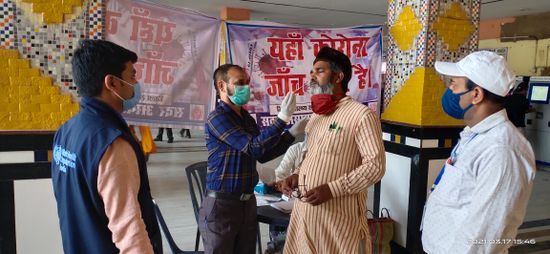
This learning package is made for Rapid Response Teams (RRTs) working at the national, sub-national, district and sub-district levels pertaining to the COVID-19 outbreak in India. In this learning package, we have emphasized essential elements such as capacity building, case finding and contact tracing, data management, management of laboratory aspects, Infection Prevention and Control (IPC), community engagement and risk communication.
Photo credit: WHO India/Md Nasimuddin
Language: English
Country specific COVID-19 response
Course information
In the context of the ongoing COVID-19 pandemic, Rapid Response Teams (RRTs) are one mechanism of a larger emergency response strategy that can be utilized for efficient response. With the current need for surge capacity, a multidisciplinary public health approach is required.
Capacity building of RRTs is very crucial in the current scenario for emergency response and this online learning package is intended to provide the key knowledge and understanding needed to mitigate, detect and respond effectively to the COVID-19 outbreak.
This learning package targets the elements of RRTs which can be multidisciplinary such as: emergency coordination; epidemiology; clinical/case management; data management; Infection Prevention and Control (IPC); laboratory; social mobilization/anthropology; risk communication; psychological support; and logistics. In addition, it targets health officials who are responsible for the oversight and technical support at the national, sub-national, district and sub-district levels.
Course Duration: 2 hours
Certificates: A Record of Achievement certificate will be available to participants who score at least 80% of the total points available across all of the quizzes. Participants who receive a Record of Achievement can also download an Open Badge for this course. Click here to learn how.
These training materials have been developed based on content drawn from the Rapid Response Teams Training Programme, available at: https://extranet.who.int/hslp/package/rapid-response-teams-training-programme, which is © the World Health Organization (WHO), and used with permission from WHO. WHO disclaims any responsibility for any modifications to, or revisions of, the WHO copyrighted materials.
What you'll learn
- Constitute an RRT for emergency response during the COVID-19 outbreak;
- Conduct active case finding and contact tracing in the context of COVID-19;
- Manage the epidemiological data for decision-making in the context of the COVID-19 outbreak;
- Manage laboratory samples (collection, packaging and transportation) in the context of COVID-19;
- Prevent and control infections (early identification and source control, environmental cleaning and disinfection, home-based care, safe management of a dead body, biomedical waste management, etc.) related to COVID-19; and
- Engage communities and communicate risk in the context of COVID-19.
Course contents
Module 1: Emergency response capacity building during an active COVID-19 response:
By the end of this module, you should be able to: explain the application of emergency management principles, the Incident Management System (IMS) and use of a Health Emergency Operations Centre (HEOC) / Strategic Health Operations Centre (SHOC) for RRT management; describe the flexibility of the IMS to adapt to COVID-19 response; explain what an RRT is, its characteristics, key activities and rationale; provide guidance on how to compose an RRT based on context and needs; and elucidate COVID-19-specific operational considerations.Module 2: Conduct active case finding, contact tracing and managing epidemiological data in the context of the COVID-19 outbreak:
This module is comprised of 2 units. By the end of unit 2a, you should be able to: conduct active case finding and contact tracing using the appropriate processes and tools in the context of COVID-19. By the end of unit 2b, you should be able to: provide the knowledge and tools needed to efficiently manage epidemiological data in the context of the COVID-19 outbreak.Module 3: How to manage laboratory samples in the context of COVID-19:
By the end of this module, you should be able to: describe what to know before you go to the field; what samples to collect; sample collection and transportation; personal protective equipment (PPE) use; and field-scenario to help understand the stepwise approach.Module 4: Infection Prevention and Control in the context of COVID-19:
By the end of this module, you should be able to: orient RRTs on the basics of Infection Prevention and Control (IPC) to enable them to implement; COVID-19 transmission prevention strategies; standard precautions; triage, early identification and source control; environmental cleaning, and disinfection; home-based care for COVID-19; safe management of a dead body in the context of the COVID-19 outbreak; and biomedical waste management.Module 5: How to engage communities and communicate risk in the context of COVID-19:
By the end of this module, you should be able to: use the appropriate principles and tools for community engagement and risk communication; and provide the science behind communicating effectively during pandemics to mitigate fear and panic, to address rumors and facilitate COVID-19-appropriate behaviors.
Enroll me for this course
Certificate Requirements
- Gain a Record of Achievement by earning at least 80% of the maximum number of points from all graded assignments.
- Gain an Open Badge by completing the course.